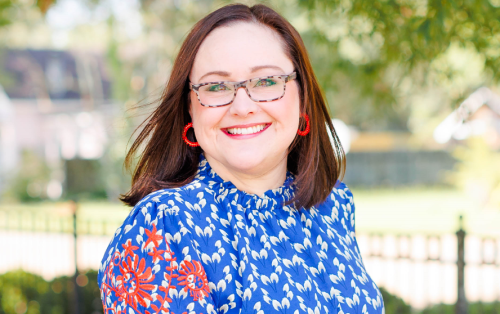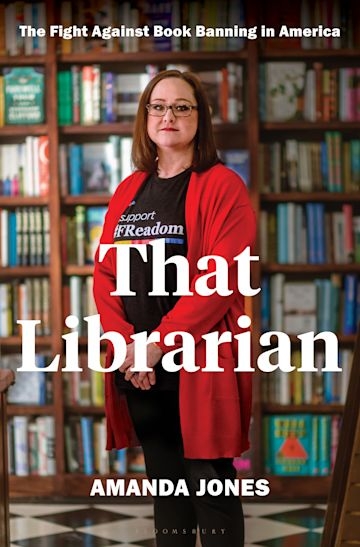Librarian Criticized Book Bans and Faced a Barrage of Hate. She Wrote a Book About it.

This article first ran in The Kansas City Star on July 14, 2024.
Amanda Jones’ life changed forever after she spoke at a public library board meeting two years ago in Livingston Parish, Louisiana.
“I gave a very blanket speech about censorship. I didn’t talk about any particular books, I didn’t mention any titles or anything like that,” Jones, a 23-year veteran of public education, explains.
In her forthcoming book, That Librarian, Jones shares what came next: a sustained barrage of bizarre and erroneous social media posts about her, death threats, a leave of absence from her work as a school librarian, her filing of an anti-defamation lawsuit, and, ultimately, publication of the book.
One early post asked — apropos of nothing — why Jones was fighting “so hard to keep sexually erotic and pornographic materials in the kid’s [sic] section.”
Social media users, friends and strangers alike, posted and reposted that and other comments until the story about her had nearly gone viral.
Jones writes in the book: “As if a kid could be looking for The Very Hungry Caterpillar and whoops, there’s the Joy of Sex or The Kama Sutra right next to it. That’s never the case. Libraries have collection development policies for ordering books, and appropriate books are placed in the appropriate section.”

It felt impossible to understand what was happening, she recalls. At that point, she’d been an educator for 21 years in the tiny town she grew up in. She was the 2020 Louisiana School Librarian of the Year, 2021 School Library Journal National Librarian of the Year and the past-president of the Louisiana Association of School Librarians.
Jones writes that this attack on her was no isolated phenomenon; across the nation, school and public librarians are being targeted, as are the books on their shelves.
She notes in That Librarian that, according to the American Library Association, “Pro-censors challenged 2,571 books in 2022. … Of those titles, the vast majority were written by or about members of the LGBTQIA+ community or by and about Black people, Indigenous people, and people of color.”
Every library has a system for community members to challenge a book, which triggers an objective review process. However, as Jones saw, rather than use that process, people would photograph one page of, say, a sexual health text written for teenagers – and shelved in the young adult section – and post it on social media to frighten others into calling for the book’s removal.
The tactic works. Limiting what books are available is along the lines of not allowing certain populations, like women and minorities, to learn to read, Jones says.
That was one reason Jones spoke at that July 2022 board meeting.
An organization called Citizens for a New Louisiana had successfully stopped voters in a neighboring town from renewing one of three property taxes, costing that library system $3.5 million per year.
“It’s politicians coming in with fake controversies, so that they can have a platform of saying they’re going to save the children, and they’re going to fix these problems that don’t exist,” Jones says. “It all boils down to the basic trend of what you see in stuff like the Project 2025 is that they’re trying to defund public libraries and public schools.”
In fact, she says, it all seems frighteningly similar to Margaret Atwood’s The Handmaid’s Tale, which plays out the institution of a sweeping, Sharia-law-level censorship in the United States. Atwood will speak at the Kansas City Public Library on Sept. 24.

“I tell people all the time I feel like I’m living in The Handmaid’s Tale. It’s the same people and the same organizations that push book banning who are also against women’s rights. They’re against abortion. They’re against, you know, birth control. It’s the same thing. It’s the same world,” she says.
“I think if more people read The Handmaid’s Tale, more people would be against book banning.”
Jones says she’s not concerned that her book will only reach readers who agree with her.
“The majority of the people in my community are Republican. They’re going to read it because they want to know the tea. It’s my hope that that will be the case in a lot of places,” she says.
Jones’ mom has supported her through her transformation from a small-town school librarian to a national anti-censoring, First Amendment advocate – but that doesn’t mean she initially agreed with her daughter any more than their neighbors did.
Now, however, her mom is on board, and this is why Jones is hopeful that others will also understand that it’s not OK for groups like those who’ve harassed her to, essentially, start scary rumors.
After her mother read three or four chapters of That Librarian and declared that she’d read enough, Jones said, “‘Please finish reading the rest of it.’ So, she read the rest of it, and it completely changed her mind. It opened her eyes, and she then understood what I was talking about. But she had to read the whole thing.”
JOIN THE CLUB
The Kansas City Star partners with the Kansas City Public Library to present a book-of-the-moment selection. We invite the community to read along. Kaite Mediatore Stover, the Library’s director of readers’ services, will lead a discussion of Amanda Jones’ That Librarian at 6 p.m. Monday, Aug. 26, with the author briefly attending virtually. The book is due out in August; secure a copy early and sign up for the discussion by emailing Stover at kaitestover@kclibrary.org.
MEET THE AUTHOR
Amanda Jones will speak about That Librarian at 6 p.m. Sept. 25 at Central Library, 14 W. 10th St. Free. RSVP later at kclibrary.org.
AN EXCERPT
Most people see what is happening, yet they don’t do or say anything to stop it. Nobody wants the haters zeroing in on them, so people are hesitant to speak. They have good reasons, and fear is one of them. The alt-right ideologues are loud and quick to hurl insults. People with small businesses won’t speak out for fear that their businesses could be targeted. Politicians either won’t say anything or join the screamers, because they don’t want their words twisted – and believe me any show of support will be twisted. Parents don’t want to stand up because they’re fearful of their children being bullied. I get it, but what I don’t understand is why this silent majority doesn’t see their potential strength in numbers and come out swinging.
Rational people take it all with a grain of salt because the antics of the pro-censors are so over-the-top. But staying silent is a kind of complicity, and when people don’t push back, censorship efforts gain traction, and one day I’m afraid it will be too late. What the general public needs to know is that these people won’t just stop at censoring books or ruining libraries. They will continue to wreak havoc on our public education system until it is irreversibly broken.